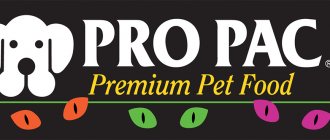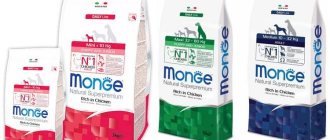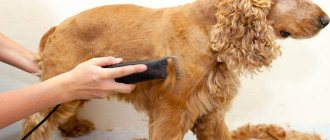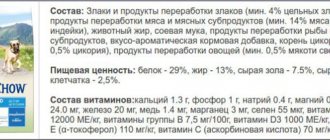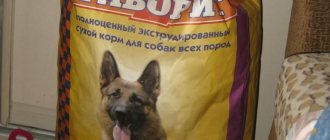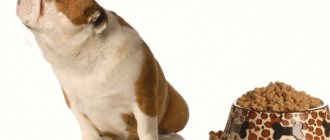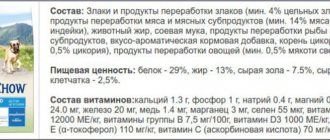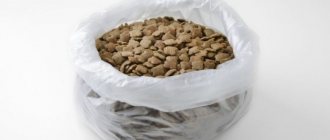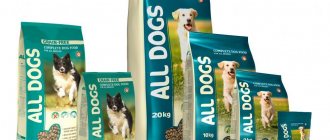How to provide your dog with balanced nutrition during feeding.
Just like in humans, the period of pregnancy and lactation in pets is very important, as the endurance of puppies is formed, and the expectant mother remains healthy.
To comply with all the nuances, it is important to understand what food to feed a nursing dog and how to provide it with proper nutrition before and after birth.
It doesn’t matter at all whether the puppies are purebred or not, the pet needs to be taken care of regardless of its origin.
Preparation
You should think about proper nutrition before mating in order to prepare the body. Overeating and obesity are unacceptable; in the future, excess weight will negatively affect your health.
During pregnancy, blood volume increases and the load on the liver and kidneys increases. The growing uterus moves the diaphragm and compresses the lungs, so the need to breathe increases.Food must cover energy costs, so the schedule and nutritional value of lunch differs depending on the breed, size and age of the dog.
Basic principles of diet planning
When a dog is going through such an important period in its life, it is advisable to protect it from all kinds of stress and drastic changes. This also applies to the menu during pregnancy.
The diet must be compiled taking into account certain principles, following which will ensure a comfortable pregnancy for the dog and healthy puppies:
- Feeding should remain as it was before pregnancy: either industrial food or natural products.
- You should not mix ready-made food with homemade food, much less feed your dog from the table.
- You can only change the brand of finished food to a higher quality one: super-premium or holistic class.
- In the daily diet of a pregnant dog, biases towards any one nutritional element are unacceptable. It must necessarily include proteins, fats and carbohydrates.
- The calorie content and nutritional value of the diet during pregnancy and feeding puppies must be increased.
- At the same time, feeding should not lead to excessive weight gain. Due to overfeeding, metabolism is disrupted, puppies can become too large, which will significantly complicate the birth process.
What does a pregnant bitch eat before giving birth?
It is worth considering whether it is possible to feed a nursing dog different foods. Judging by the reviews from breeders, you should not suddenly change your pet’s diet and switch to a different type of food, this will lead to stress, and she will not understand why the new, incomprehensible food is given.
- If the bitch always eats ready-made food, then it is advised to switch to a special product of the same brand as usual. Some veterinarians recommend starting to add regular food in small portions, and eventually switching to a completely natural diet.
- If before mating the basis of the diet was meat, fish and vegetables, then you need to adjust the amount of food, be sure to add fermented milk products (consume separately from meat). Two thirds of your lunch should consist of lean meat.
Pregnant bitches are given apples, carrots, zucchini, pears and pumpkin. Don't forget to give meat on the bones to clean plaque and make sure your dog always has clean water in his bowl!
Feeding during labor and immediately after birth
It is not recommended to feed the animal after the first contractions appear. Childbirth should occur exclusively on an empty stomach and there are a number of reasons for this:
- During childbirth, a dog’s body experiences a drop in temperature, a slowdown in metabolism, and indigestion;
- A full intestine makes it difficult for the offspring to move through the birth canal;
- Well-fed dogs experience prolonged contractions that are more severe than hungry ones;
- During childbirth, individuals with a full stomach may experience involuntary vomiting or bowel movements.
Feeding a dog after giving birth depends on whether she ate the afterbirth or not. The placenta contains proteins, vitamins and microelements necessary for the production of colostrum, as well as hormones that promote milk production. After eating the placenta, the animal is fed after 5 hours, but if the dog does not eat postpartum discharge, then you can offer it food after an hour.
To prevent the occurrence of disorder in a dog as a result of eating a large amount of placenta, you can give the animal activated charcoal at the rate of 1 tablet per 1 kg of body weight, or feed it rice porridge once a day for several days to normalize stool.
If a dog has diarrhea after eating a large amount of afterbirth, you need to carefully monitor the animal’s condition. If it gets worse, it may be necessary to use medications. In this case, the puppies will have to be fed with goat's milk or other suitable food until the mother gets better.
After birth, it is necessary to change the bedding and wash the animal’s body from traces of discharge. It is better to place a bowl of water or milk closer to the place where the mother and puppies lie, since at first she will not leave her cubs.
Vitamins
Before purchasing expensive complexes of vitamins and minerals, consultation with a veterinarian is required! High-quality food for puppies and nursing dogs contains all the necessary substances to maintain health.
- Veterinary medicine. What is it and why is it relevant now?
Akita Inu. Features of the breed.
Diet of a pregnant dog: what and how to feed a pregnant dog correctly
Only a certified specialist, based on individual characteristics and situation, can prescribe supplements.
Problems with the health of the animal during the feeding period
If a dog refuses to eat during lactation, this may indicate serious problems and disorders in its body. In this case, you need to contact a veterinarian who will conduct visual and ultrasound examinations, and also take the necessary tests to determine the cause of poor appetite.
Very often, during lactation, dogs experience eclampsia - calcium deficiency in the body. Small breeds such as Yorkies, Chihuahuas or Toy Terriers are prone to this disease. Therefore, the diet of such dogs should be monitored very carefully, and, at the slightest suspicion of a deterioration in the animal’s condition, it is necessary to contact a veterinarian.
Eclampsia is accompanied by a sharp deterioration in the health of the nursing mother, anxiety, weakness, refusal of water and food, convulsions, impaired coordination and breathing. Therefore, contacting a specialist in this situation is inevitable, but it is better to prevent the development of this disease.
Pregnancy and lactation are a very important period in a dog’s life, when it needs special attention and care from its owners. Having a balanced and healthy diet significantly reduces the risk of diseases and developmental abnormalities in small puppies and has a positive effect on the health of their mother. Therefore, it is very important to know what to feed your dog after giving birth and how to do it correctly.
Photos of food for nursing dogs
Help the project, repost

1+
When to adjust your diet
Changes in the usual diet do not have to be made immediately after mating. During the first weeks, the dog may suffer from toxicosis. The consequence of this is a decrease in appetite. Improvement in well-being will occur at the end of the first month, and then you need to review the menu in order to increase its calorie content and volume. The amount of feed should be increased gradually: every week by about 15%. By the end of pregnancy, the amount of food eaten should be 60% more than at the beginning.
It is necessary that the amount of nutrients supplied with food is sufficient for the full formation of the organs and systems of the fetus or several embryos without harming the body of the pregnant bitch.
Those dogs that eat natural foods definitely need additional vitamin and mineral supplements. You can start administering them from the very beginning of pregnancy or before its onset in order to prevent hypovitaminosis.
Pets kept on ready-made industrial feeds are switched to specialized mixtures for whelping or lactating bitches from the fifth week of pregnancy. It must be remembered that when feeding dry food, clean water should always be available. This food tends to swell in the intestines, causing constipation.
By the 40th day of pregnancy, the puppies in the womb have grown significantly, and the stomach is compressed. At this time, the dog needs to be fed up to 5 times throughout the day, dividing the daily amount of food between all feedings. At the same time, single servings are reduced.
Starting from the seventh week of pregnancy, approximately 50 days, the dog prepares for childbirth. To facilitate this process, reduce the intake of protein products from food, reducing their volume. It is also better to avoid additional calcium intake at this time.
Weaning
At what age are puppies finally weaned from the bitch? At 6-8 weeks, this was the case before. Nowadays weaning is practiced at 4 weeks of age. It is not right. Firstly, the puppy does not fully receive vitamins from its mother’s milk. Secondly, such children may have problems with socialization in the future. Thirdly, such a dog is guaranteed to have weak immunity.
Carbohydrates
Very often, people mistakenly call carbohydrates all foods containing this nutrient, for example, cereals, legumes, potatoes, although they contain, in addition to carbohydrates, vegetable protein, fat, fiber, and so on. It is correct to call a group of feed nutrients carbohydrates, which will be discussed further.
Like animal fat, carbohydrates are a source of energy. They break down quite quickly (different types at different speeds) into glucose, which is a universal “fuel” for the body of all representatives of the animal world, including dogs.
Carbohydrates, as such, are not needed in the diet of dogs as carnivorous predators, at least in the quantities in which they are used in some ready-made industrial diets, and also often in natural food. We think you know this very well! AAFCO, NRC and FEDIAF have not established recommended minimum or maximum carbohydrate levels in feeds, so most manufacturers do not list carbohydrate levels at all in their guaranteed analysis.
How to determine the amount of carbohydrates in food?
Look at the packaging of your dogs food and check how many carbohydrates it contains. In order to calculate their approximate amount, add up the protein, fat, ash, fiber and moisture indicators from the guaranteed analysis, and then subtract this amount from 100. The resulting result will be the approximate percentage of carbohydrates in the feed. An adequate level of carbohydrates in dry food is about 30%.
It is impossible to produce dry food completely without carbohydrates; they are needed to form the granule. But manufacturers, firstly, can reduce the amount of carbohydrates due to the current level of technology, and secondly, choose other sources of carbohydrates, minimizing the use of cereals.
Why are grains dangerous for dogs?
Almost all of them are sources of fast carbohydrates, which quickly break down and provoke a jump in the animal’s blood sugar level. The body responds by increasing insulin levels - as a result, the sugar level instantly drops, while the animal experiences a feeling of weakness and hunger. Insulin “swings” that occur when consuming grain-based foods contribute to obesity, diabetes and other diseases in dogs.
If we consider preparing natural diets, we recommend replacing semolina, millet, barley, corn, rye and even rice with low-glycemic buckwheat, and when choosing an industrial diet, prefer options with complex carbohydrates found in vegetables and legumes. It is the latter that are used in most so-called “holistic” foods, as well as in a separate class - biologically appropriate diets, which include products from the Acana and Orijen brands.
On the question of legumes
Complex carbohydrates in legumes are broken down slowly and, accordingly, blood glucose levels increase gradually, without causing sudden spikes in insulin.
Objections are sometimes raised to the use of legumes in dog nutrition due to the fact that they can cause individual reactions such as bloating and flatulence, especially when used in large quantities. That is why cooking legumes at home requires long-term pre-soaking and subsequent cooking. In ready-made industrial rations, this problem is solved by pre-processing and extrusion of the raw materials. It is advisable that the level of legumes in the feed does not exceed 15–20%.
Features of a menu made from natural products
With a natural diet, the majority are protein products: high-quality lean meats - veal, chicken, turkey, offal (liver, tripe). It is better to boil them for a few minutes before using. Another healthy source of protein is sea fish.
Milk, cottage cheese, and natural yogurt will also benefit a pregnant pet. It is better to give preference to fermented milk products, since many dogs are intolerant to lactose (milk sugar), which is found in excess in cow's milk.
You can offer raw egg yolks twice a week. They are able to enrich the body with vitamins A, D, and folic acid. It is not recommended to feed raw protein - it contains avidin, which interferes with the absorption of biotin in the intestines. Biotin is one of the B vitamins. It ensures normal sebum production, which has a beneficial effect on the dog's coat.
Vegetables and fruits are a source of fiber. Regular intake is a good prevention of constipation. You should not include cabbage, legumes, or potatoes in your diet. This can lead to bloating and indigestion.
All products offered to a pregnant dog must be of high quality and completely safe. With a balanced diet, the dog does not need additional artificial food additives in the diet. But it is quite difficult for the owner to achieve this on his own. Therefore, vitamin-mineral complexes are always required for natural feeding.
